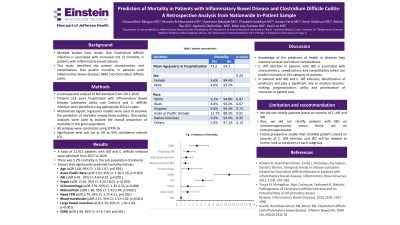Monday Poster Session
Category: IBD
P2135 - Predictors of Mortality in Patients With Inflammatory Bowel Disease and Clostridium difficile Colitis: A Retrospective Analysis From Nationwide Inpatient Sample
Monday, October 23, 2023
10:30 AM - 4:15 PM PT
Location: Exhibit Hall

Has Audio

Oluwanifemi Balogun, MD
Albert Einstein Medical Center
Philadelphia, PA
Presenting Author(s)
Oluwanifemi Balogun, MD1, Blanche Echikunwoke, MD1, Oyedotun Babajide, MBBS2, Elizabeth Soladoye, MD, MPH3, Jordan Carty, MD1, Kevin Robinson, MD1, Rohan Rau, DO4, Ayobami Olafimihan, MD5, Mikaela Nikkola Jara-Tantoco, MD1, Kevin Lo, MD1
1Albert Einstein Medical Center, Philadelphia, PA; 2One Brooklyn Health, Brooklyn, NY; 3Piedmont Athens Regional, Athens, GA; 4Albert Einstein Internal Medicine Residency, Philadelphia, PA; 5John H. Stroger, Jr. Hospital of Cook County, Chicago, IL
Introduction: Multiple studies have shown that Clostridium difficile infection is associated with increased risk of mortality in patients with Inflammatory bowel disease. This study identified the patient characteristics and complications that predict mortality in patients with inflammatory bowel diseases (IBD) and Clostridium difficile colitis.
Methods: We utilized the National Inpatient Sample (NIS) 2017-2020 database. Patients >18 years hospitalized with Inflammatory Bowel Disease (ulcerative colitis and Crohn’s) and C. difficile infection were identified using appropriate ICD-10 codes. Multivariate logistic regression models were used to examine the predictors of mortality among these patients. Descriptive analyses were used to explore the overall proportion of mortality in this given population. Analysis was done at 95% confidence Interval (CI) with a two-tailed p-value of 5% set as significance level
Results: A total of 22, 915 patients with IBD and C. difficile infection were admitted. There was 5.2% mortality in this sub-population of patients. Factors that significantly predict mortality included older age, mean 72 years 95% CI (70.60-73.88); for every increase in age the adjusted odds of mortality was 1.06(95% CI 1.05-1.07) p< 0.001. Other factors as shown in the table are: Asian Pacific descent, admission to urban centers, acute kidney injury, sepsis, gastrointestinal hemorrhage, blood transfusion, patients who underwent large bowel resection, those requiring total parenteral nutrition (TPN), stage V chronic kidney disease (CKD) and coronary artery disease (CAD)
Discussion: Knowledge of the predictors would play a significant role in medical decision-making, prognostication, utility and prioritization of resources in patient care. These would also enable preparedness and reduce disease mortality overall
Disclosures:
Oluwanifemi Balogun, MD1, Blanche Echikunwoke, MD1, Oyedotun Babajide, MBBS2, Elizabeth Soladoye, MD, MPH3, Jordan Carty, MD1, Kevin Robinson, MD1, Rohan Rau, DO4, Ayobami Olafimihan, MD5, Mikaela Nikkola Jara-Tantoco, MD1, Kevin Lo, MD1. P2135 - Predictors of Mortality in Patients With Inflammatory Bowel Disease and Clostridium difficile Colitis: A Retrospective Analysis From Nationwide Inpatient Sample, ACG 2023 Annual Scientific Meeting Abstracts. Vancouver, BC, Canada: American College of Gastroenterology.
1Albert Einstein Medical Center, Philadelphia, PA; 2One Brooklyn Health, Brooklyn, NY; 3Piedmont Athens Regional, Athens, GA; 4Albert Einstein Internal Medicine Residency, Philadelphia, PA; 5John H. Stroger, Jr. Hospital of Cook County, Chicago, IL
Introduction: Multiple studies have shown that Clostridium difficile infection is associated with increased risk of mortality in patients with Inflammatory bowel disease. This study identified the patient characteristics and complications that predict mortality in patients with inflammatory bowel diseases (IBD) and Clostridium difficile colitis.
Methods: We utilized the National Inpatient Sample (NIS) 2017-2020 database. Patients >18 years hospitalized with Inflammatory Bowel Disease (ulcerative colitis and Crohn’s) and C. difficile infection were identified using appropriate ICD-10 codes. Multivariate logistic regression models were used to examine the predictors of mortality among these patients. Descriptive analyses were used to explore the overall proportion of mortality in this given population. Analysis was done at 95% confidence Interval (CI) with a two-tailed p-value of 5% set as significance level
Results: A total of 22, 915 patients with IBD and C. difficile infection were admitted. There was 5.2% mortality in this sub-population of patients. Factors that significantly predict mortality included older age, mean 72 years 95% CI (70.60-73.88); for every increase in age the adjusted odds of mortality was 1.06(95% CI 1.05-1.07) p< 0.001. Other factors as shown in the table are: Asian Pacific descent, admission to urban centers, acute kidney injury, sepsis, gastrointestinal hemorrhage, blood transfusion, patients who underwent large bowel resection, those requiring total parenteral nutrition (TPN), stage V chronic kidney disease (CKD) and coronary artery disease (CAD)
Discussion: Knowledge of the predictors would play a significant role in medical decision-making, prognostication, utility and prioritization of resources in patient care. These would also enable preparedness and reduce disease mortality overall
Disclosures:
Oluwanifemi Balogun indicated no relevant financial relationships.
Blanche Echikunwoke indicated no relevant financial relationships.
Oyedotun Babajide indicated no relevant financial relationships.
Elizabeth Soladoye indicated no relevant financial relationships.
Jordan Carty indicated no relevant financial relationships.
Kevin Robinson indicated no relevant financial relationships.
Rohan Rau indicated no relevant financial relationships.
Ayobami Olafimihan indicated no relevant financial relationships.
Mikaela Nikkola Jara-Tantoco indicated no relevant financial relationships.
Kevin Lo indicated no relevant financial relationships.
Oluwanifemi Balogun, MD1, Blanche Echikunwoke, MD1, Oyedotun Babajide, MBBS2, Elizabeth Soladoye, MD, MPH3, Jordan Carty, MD1, Kevin Robinson, MD1, Rohan Rau, DO4, Ayobami Olafimihan, MD5, Mikaela Nikkola Jara-Tantoco, MD1, Kevin Lo, MD1. P2135 - Predictors of Mortality in Patients With Inflammatory Bowel Disease and Clostridium difficile Colitis: A Retrospective Analysis From Nationwide Inpatient Sample, ACG 2023 Annual Scientific Meeting Abstracts. Vancouver, BC, Canada: American College of Gastroenterology.
